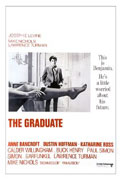
Directed by
Mike Nichols
105 minutes
Rated M
Reviewed by
Bernard Hemingway

The Graduate
The Graduate is an iconic 1960s movie both because it marked the mainstream entertainment industry's acknowledgement of non-regulation sexual behaviour amongst otherwise conventional people (Nichols originally offered the Mrs Robinson role to Doris Day who turned it down for its dubious morals) and for its portrayal of a "confused" young man just starting to respond to the Zeitgeist rebellion against middle class values.
Dustin Hoffman plays Benjamin Braddock, newly arrived back home in southern California after successfully completing his college degree. His parents are well-to-do middle class suburbanites who expect him to do great things but Benjamin is not sure what he wants to do. First he meets Mrs Robinson (Anne Bancroft in an image-defining role) and starts an affair with her at her behest, Then after being pushed into a date with her daughter, Elaine (Katharine Ross) he finds true love with her but the mother isn’t happy,.
Far from being in any way radical, in many ways for 1967 the film feels curiously out-of-date by a good few years. Not only does the clean-cut Benjamin with his tie and sports jacket, neatly combed hair and sports car seem oddly out of time (the night exteriors when Benjamin takes Elaine to a strip club show the already pervasive influence of hippie culture). This anomaly is explained by the fact that the original novel by Charles Webb was published in 1963. The Simon and Garfunkel soundtrack masks the disparity somewhat but really Benjamin's urgent desire to get married shows how little he has understood his "confusion" or the experimental imperatives of the '60s
This feeling is compounded by the fact that Hoffman, in his first major screen appearance, at the age of thirty is way too old to play the twenty-one year old his character is supposed to be (Hoffman's New York Jewish accent is yet another issue). For all this, the quality script by Buck Henry (although Calder Wallingham has a writing credit his version was never used), the fine performances by Hoffman and Bancroft, Robert Surtees' unvarnished lensing and Nichols' skilful directing make for a winning package.
The film is best in its early stages simply because the temporal incongruity is less obvious, the satire is amusing and the cat-and-mouse relationship between Benjamin and Mrs Robinson is deftly realized. Once Elaine enters the scene and Mrs Robertson drops out of sight it becomes more plot-driven (and quite superficially so) only peaking again with the oft-quoted closing scene of Benjamin’s heartfelt cry to Elaine through the huge portico window of the church where she is (remarkably suddenly) about to marry someone else and their subsequent absconding the parental straitjacket intended for them. Although there is a classically hanging ending, wisely, there wasn't a sequel with them as flower-children)
Audiences of the time identified with the film and it was a smash hit with Mike Nichols surprisingly winning the Best Director Oscar for that year over Arthur Penn whose Bonnie and Clyde received little love from the Academy, whilst the Best Film Oscar went to Norman Jewison's In The Heat Of The Night.
Want something different?





